2016贵州中考试题研究·英语(课标版)课件:第一部分教材知识研究八年级(下)Unit 6
文档属性
| 名称 | 2016贵州中考试题研究·英语(课标版)课件:第一部分教材知识研究八年级(下)Unit 6 | 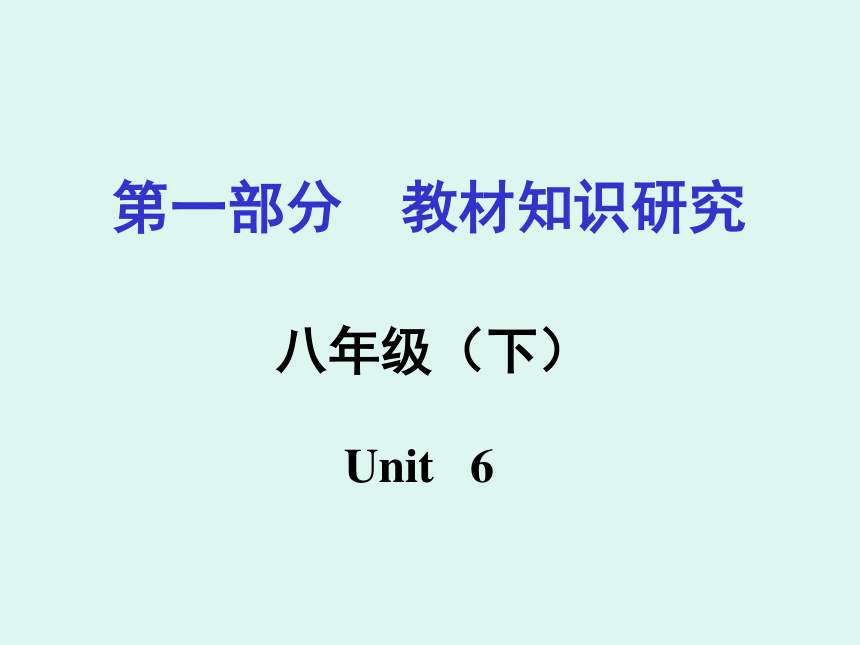 | |
| 格式 | zip | ||
| 文件大小 | 92.2KB | ||
| 资源类型 | 教案 | ||
| 版本资源 | 人教新目标(Go for it)版 | ||
| 科目 | 英语 | ||
| 更新时间 | 2015-12-09 20:05:46 | ||
图片预览

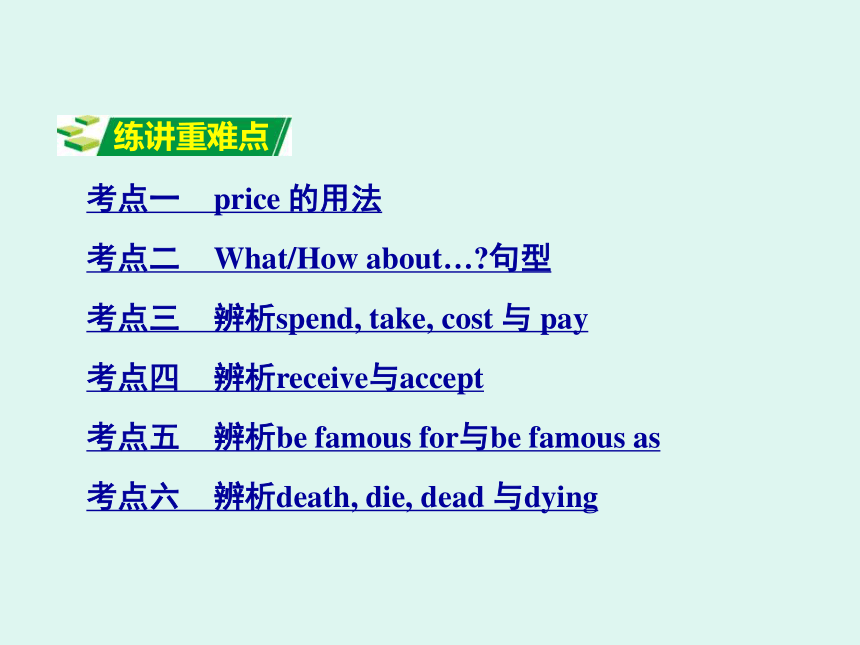
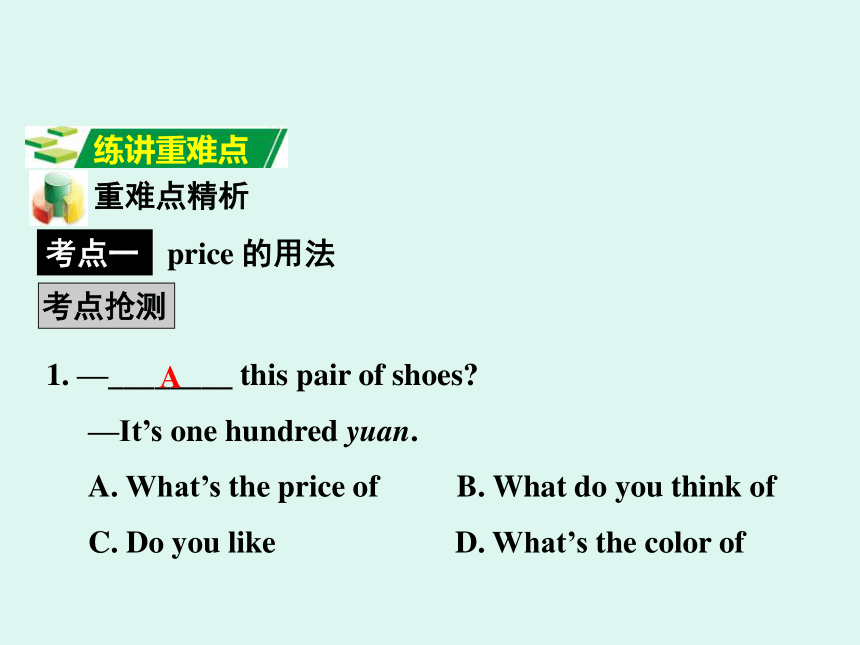
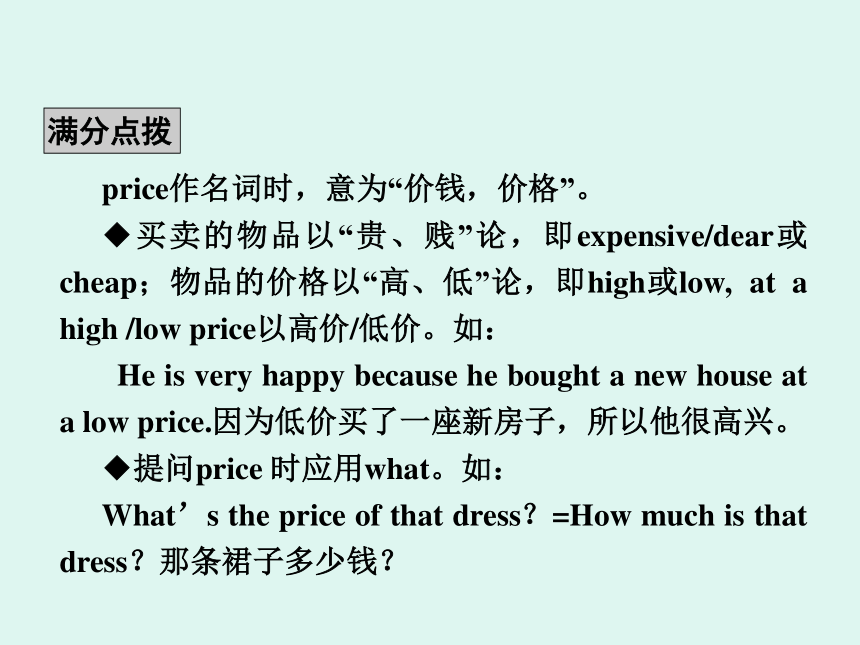
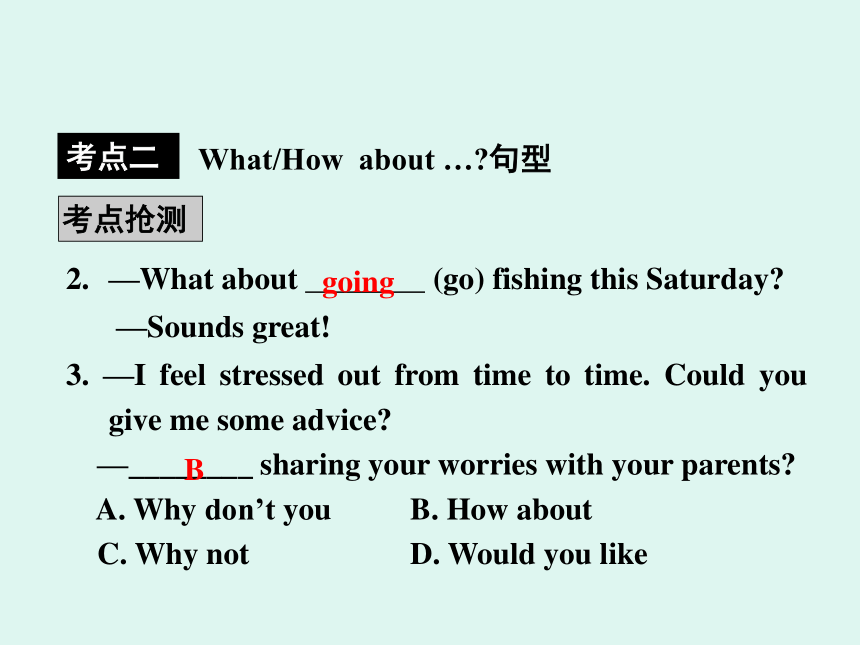
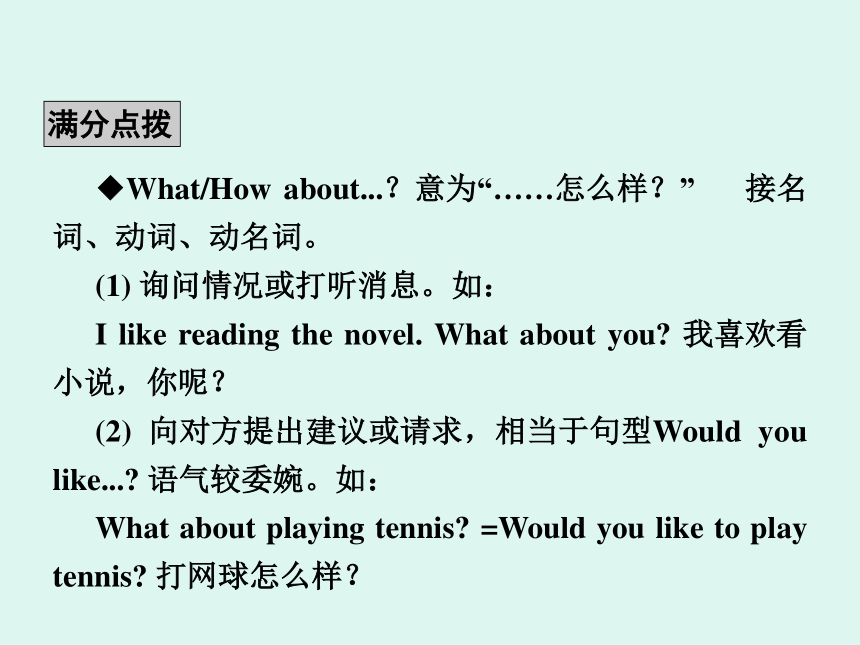
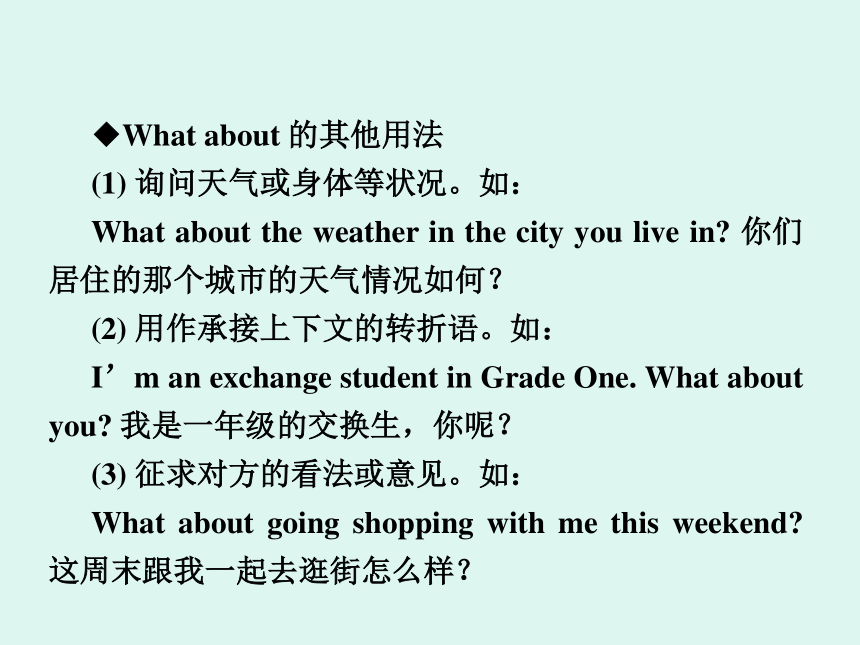
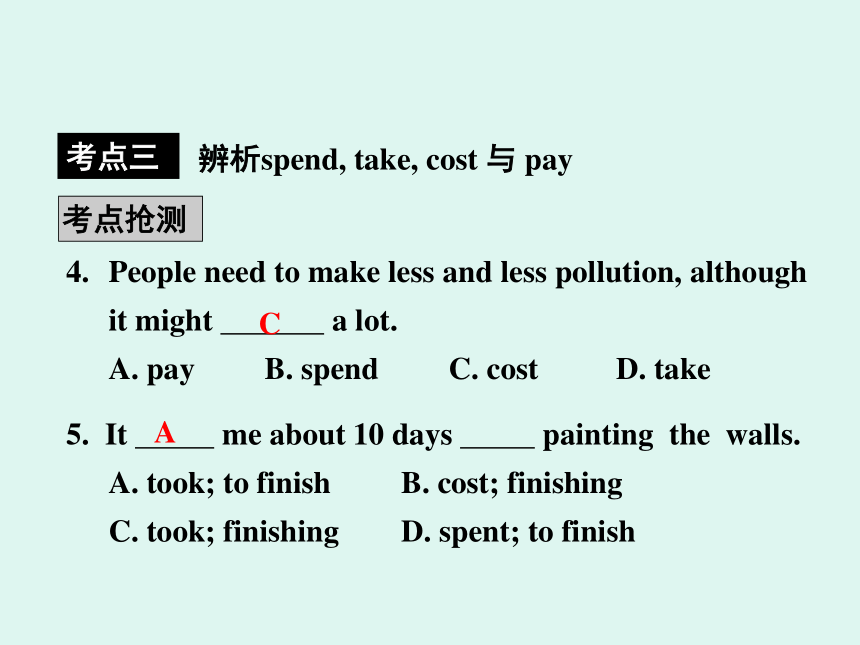
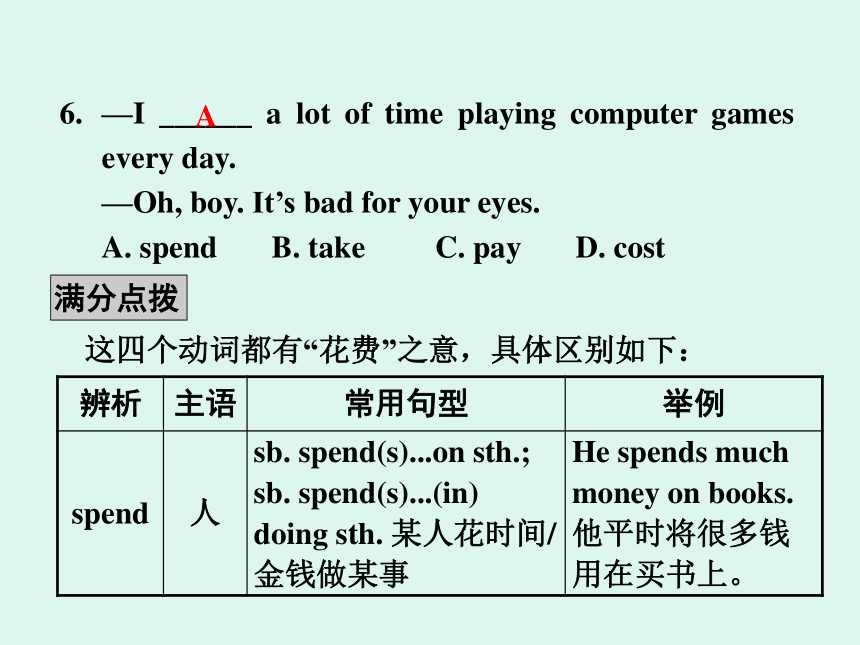
文档简介
课件20张PPT。第一部分 教材知识研究八年级(下)Unit 6考点一 price 的用法
考点二 What/How about…?句型
考点三 辨析spend, take, cost 与 pay
考点四 辨析receive与accept
考点五 辨析be famous for与be famous as
考点六 辨析death, die, dead 与dying练讲重难点1. —________ this pair of shoes?
—It’s one hundred yuan.
A. What’s the price of B. What do you think of
C. Do you like D. What’s the color ofA练讲重难点重难点精析考点一price 的用法考点抢测price作名词时,意为“价钱,价格”。
◆买卖的物品以“贵、贱”论,即expensive/dear或cheap;物品的价格以“高、低”论,即high或low, at a high /low price以高价/低价。如:
He is very happy because he bought a new house at a low price.因为低价买了一座新房子,所以他很高兴。
◆提问price 时应用what。如:
What’s the price of that dress?=How much is that dress?那条裙子多少钱?满分点拨2. —What about (go) fishing this Saturday?
—Sounds great!going考点二What/How about …?句型考点抢测3. —I feel stressed out from time to time. Could you give me some advice?
—________ sharing your worries with your parents?
A. Why don’t you B. How about
C. Why not D. Would you likeB◆What/How about...?意为“……怎么样?” 接名词、动词、动名词。
(1) 询问情况或打听消息。如:
I like reading the novel. What about you? 我喜欢看小说,你呢?
(2) 向对方提出建议或请求,相当于句型Would you like...? 语气较委婉。如:
What about playing tennis? =Would you like to play tennis? 打网球怎么样?满分点拨◆What about 的其他用法
(1) 询问天气或身体等状况。如:
What about the weather in the city you live in? 你们居住的那个城市的天气情况如何?
(2) 用作承接上下文的转折语。如:
I’m an exchange student in Grade One. What about you? 我是一年级的交换生,你呢?
(3) 征求对方的看法或意见。如:
What about going shopping with me this weekend? 这周末跟我一起去逛街怎么样? 4. People need to make less and less pollution, although it might a lot.
A. pay B. spend C. cost D. takeC 考点三辨析spend, take, cost 与 pay考点抢测5. It me about 10 days painting the walls. A. took; to finish B. cost; finishing
C. took; finishing D. spent; to finishA6. —I ______ a lot of time playing computer games every day.
—Oh, boy. It’s bad for your eyes.
A. spend B. take C. pay D. costA这四个动词都有“花费”之意,具体区别如下:满分点拨7. Try to yourself as you are and then you’ll be more confident.
A. accept B. receive C. expect D. attendA考点四辨析receive 与 accept考点抢测8. His family are worried about him because they haven’t ________ letters from him for a long time.
A. accepted B. received C. written D. collectedB receive和accept都可表示“收到,接收” ,具体区别如下:
◆receive仅是表示客观上收到,不表示主观上是否愿意接受。receive多是接受实际的东西,如信件、礼物等,常与from连用。如:
She has received his present, but she will not accept it. 她收到了他的礼物,但她是不会接受的。满分点拨 ◆accept多是接受抽象的东西,如想法、表扬、批评、道歉等,表示主观上愿意“接受”。
如:I accepted your ideas. 我接受你的观点。
◆表示“接见”、“接待”时,要用 receive 而不用 accept。
如:She was warmly received. 她受到热情接待。9. 中国以其悠久历史而闻名。
China its long history.
10. Kim Soo Hyun (金秀贤) is famous ________ a great actor in Asia.
A. as B. to C. for D. aboutis famous/known forA考点五辨析be famous for 与 be famous as考点抢测 ◆ be famous for相当于be known for,意为“以……闻名”,后接表示人或事物某方面特点、特长的词。
◆ be famous as相当于be known as,意为“作为……而出名”,后接表示身份、职业名称的词。如:
Lu Xun is famous as a great writer. He is famous for his works. 鲁迅作为一名伟大的作家而出名。他以他的作品闻名。满分点拨考点六辨析death, die, dead 与dying(温馨提示:点开超链接后,如需返回本页PPT请点Esc按钮) 1. The ________ of the dresses in the shop is high.
A. number B. price C. sale D. size
2. —This sweater is too long and I don’t like its color.
—What about ________?
A. it B. one C. this one D. thisBC试题在线3. —How much is the ticket to Central Park?
—A one-way ticket $40, and you can . another $20 for a round-trip.
A. costs; pay B. cost; spend
C. pay; spend D. spends; payA4. Many visitors go to Paris. Do you know what it ________?
A. is famous as B. is famous for
C. is famous with D. is famous inB
5. I ________ some flowers, but I didn’t ________ them.
A. received; accept B. accepted; receive
C. received; receive D. accepted; acceptA
考点二 What/How about…?句型
考点三 辨析spend, take, cost 与 pay
考点四 辨析receive与accept
考点五 辨析be famous for与be famous as
考点六 辨析death, die, dead 与dying练讲重难点1. —________ this pair of shoes?
—It’s one hundred yuan.
A. What’s the price of B. What do you think of
C. Do you like D. What’s the color ofA练讲重难点重难点精析考点一price 的用法考点抢测price作名词时,意为“价钱,价格”。
◆买卖的物品以“贵、贱”论,即expensive/dear或cheap;物品的价格以“高、低”论,即high或low, at a high /low price以高价/低价。如:
He is very happy because he bought a new house at a low price.因为低价买了一座新房子,所以他很高兴。
◆提问price 时应用what。如:
What’s the price of that dress?=How much is that dress?那条裙子多少钱?满分点拨2. —What about (go) fishing this Saturday?
—Sounds great!going考点二What/How about …?句型考点抢测3. —I feel stressed out from time to time. Could you give me some advice?
—________ sharing your worries with your parents?
A. Why don’t you B. How about
C. Why not D. Would you likeB◆What/How about...?意为“……怎么样?” 接名词、动词、动名词。
(1) 询问情况或打听消息。如:
I like reading the novel. What about you? 我喜欢看小说,你呢?
(2) 向对方提出建议或请求,相当于句型Would you like...? 语气较委婉。如:
What about playing tennis? =Would you like to play tennis? 打网球怎么样?满分点拨◆What about 的其他用法
(1) 询问天气或身体等状况。如:
What about the weather in the city you live in? 你们居住的那个城市的天气情况如何?
(2) 用作承接上下文的转折语。如:
I’m an exchange student in Grade One. What about you? 我是一年级的交换生,你呢?
(3) 征求对方的看法或意见。如:
What about going shopping with me this weekend? 这周末跟我一起去逛街怎么样? 4. People need to make less and less pollution, although it might a lot.
A. pay B. spend C. cost D. takeC 考点三辨析spend, take, cost 与 pay考点抢测5. It me about 10 days painting the walls. A. took; to finish B. cost; finishing
C. took; finishing D. spent; to finishA6. —I ______ a lot of time playing computer games every day.
—Oh, boy. It’s bad for your eyes.
A. spend B. take C. pay D. costA这四个动词都有“花费”之意,具体区别如下:满分点拨7. Try to yourself as you are and then you’ll be more confident.
A. accept B. receive C. expect D. attendA考点四辨析receive 与 accept考点抢测8. His family are worried about him because they haven’t ________ letters from him for a long time.
A. accepted B. received C. written D. collectedB receive和accept都可表示“收到,接收” ,具体区别如下:
◆receive仅是表示客观上收到,不表示主观上是否愿意接受。receive多是接受实际的东西,如信件、礼物等,常与from连用。如:
She has received his present, but she will not accept it. 她收到了他的礼物,但她是不会接受的。满分点拨 ◆accept多是接受抽象的东西,如想法、表扬、批评、道歉等,表示主观上愿意“接受”。
如:I accepted your ideas. 我接受你的观点。
◆表示“接见”、“接待”时,要用 receive 而不用 accept。
如:She was warmly received. 她受到热情接待。9. 中国以其悠久历史而闻名。
China its long history.
10. Kim Soo Hyun (金秀贤) is famous ________ a great actor in Asia.
A. as B. to C. for D. aboutis famous/known forA考点五辨析be famous for 与 be famous as考点抢测 ◆ be famous for相当于be known for,意为“以……闻名”,后接表示人或事物某方面特点、特长的词。
◆ be famous as相当于be known as,意为“作为……而出名”,后接表示身份、职业名称的词。如:
Lu Xun is famous as a great writer. He is famous for his works. 鲁迅作为一名伟大的作家而出名。他以他的作品闻名。满分点拨考点六辨析death, die, dead 与dying(温馨提示:点开超链接后,如需返回本页PPT请点Esc按钮) 1. The ________ of the dresses in the shop is high.
A. number B. price C. sale D. size
2. —This sweater is too long and I don’t like its color.
—What about ________?
A. it B. one C. this one D. thisBC试题在线3. —How much is the ticket to Central Park?
—A one-way ticket $40, and you can . another $20 for a round-trip.
A. costs; pay B. cost; spend
C. pay; spend D. spends; payA4. Many visitors go to Paris. Do you know what it ________?
A. is famous as B. is famous for
C. is famous with D. is famous inB
5. I ________ some flowers, but I didn’t ________ them.
A. received; accept B. accepted; receive
C. received; receive D. accepted; acceptA
